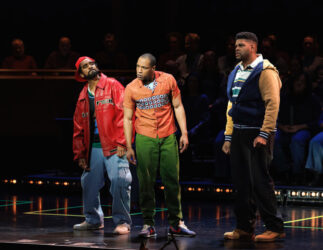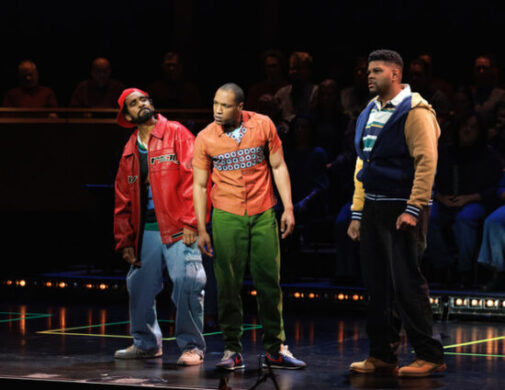 United States Scott Davenport Richards, Blind Injustice: Soloists, MasterVoices, Orchestra / Ted Sperling (conductor). Jazz at Lincoln Center’s Frederick P. Rose Hall, New York, 3.2.2025. (RP)
United States Scott Davenport Richards, Blind Injustice: Soloists, MasterVoices, Orchestra / Ted Sperling (conductor). Jazz at Lincoln Center’s Frederick P. Rose Hall, New York, 3.2.2025. (RP)

Production:
Librettist – David Cote
Director and Dramaturg – Robin Guarino
Cast:
Derrick Wheatt – Phillip Bullock
Clarence Elkins – Thomas Capobianco
Defense Attorney – Joshua Dennis
Rickey Jackson – Eric Shane Heatley
Derrick’s Mother / Ensemble – Briana Hunter
Earl Mann / Ensemble – Marc Kudisch
Nancy Smith – Reilly Nelson
Alesha – Victoria Okafor
Earl Mann’s Cellmate / Edward Vernon / Ensemble – Joseph Parrish
Prosecutor – Christian Pursell
Laurese Glover – Orson Van Gay II
Eugene Johnson – Miles Wilson-Toliver
Scott Davenport Richards’s opera Blind Injustice tells a harrowing story of glaring injustice within the US judicial and penal systems. MasterVoices’s semi-staged production featured a fantastic cast that celebrated the resilience of the human spirit in the bleakest of situations.
David Cote’s taut, cogent libretto is based on the book by Mark Godsey, Blind Injustice, and casework by the Ohio Innocence Project (OIP) at the University of Cincinnati College of Law. The opera tells the stories of six people, including teenagers, who were wrongfully imprisoned for violent crimes they did not commit. About forty percent of the libretto is drawn directly from interviews with the exonerees.
The people portrayed in the opera were victims of a justice system run amok. Nancy Smith, a school-bus driver, was wrongly convicted of molesting children at the height of ‘nursery school hysteria’ sweeping the nation. She was imprisoned for fifteen years, and her four children grew up without a mother.
Laurese Glover, Derrick Wheatt and Eugene Johnson – The ‘East Cleveland 3’ – were teenagers wrongly convicted of murder based on the false testimony of a girl who was coerced by the police. They were imprisoned for twenty years. Clarence Elkins was convicted of the murder and rape of his mother-in-law and the rape of his wife’s niece, and he was incarcerated for seven-and-a-half years. The actual perpetrator ultimately confessed.
Rickey Jackson was a teenager convicted of murder and robbery based on the coerced testimony of a twelve-year-old boy. No physical or forensic evidence linked Rickey or his two brothers to the crime. After Jackson had served 39 years in prison, the witness admitted that he had lied to the police.
Their stories are framed by two different views of the justice system. Christian Pursell’s voice blazed with pride as the hard-on-crime prosecutor who makes the facts fit the case. His legal and moral counterpart was a former prosecutor turned defense attorney, portrayed by an earnest and equally solid Joshua Dennis. Adding to the legal mix was Victoria Okafor’s Alesha, a law student working with the OIP who combined a sense of purpose with wisdom beyond her years.
The singers portraying the six accused and wrongly convicted people were dynamite. As Nancy Smith, Reilly Nelson captured the bewilderment and determination of a woman whose life was ripped from her for no reason. Thomas Capobianco’s Clarence Elkins was a simmering volcano who doggedly challenged the prosecutorial missteps that led to his conviction.

As The Cleveland 3, Phillip Bullock (Derrick Wheatt), Miles Wilson-Toliver (Eugene Johnson) and Orson Van Gay II (Laurese Glover) were cool, calculating and defiant. They also got some of the best music to sing and move to with its undercurrents of hip-hop.
Eric Shane Heatley’s Rickey Jackson was as proud and funky as the music in which Richards enveloped him. Heatley’s depiction of Jackson’s evolution from a volatile, hostile young man to one who discovered purpose through books was one of the most moving aspects of the entire opera.
Richards’s score is eclectic. In addition to funk and hip-hop, he dips into jazz, gospel and the simplicity and repetition of minimalism. The vocal writing is primarily declaratory, as all of the characters have stories to tell, but there are arias and ensembles as powerful as the stories that they convey.
These include ‘The Hole’ in which Van Gay II described repeated periods of solitary confinement in a cramped space with blistering emotion and a searing voice. Brianna Hunter as Derrick Wheatt’s mother poured her soul and voice into describing the corned beef sandwich she would make for her son upon his release, and roared as she sang of tearing the evil prison down with her bare hands if only she could. Reilly Nelson’s singing of Nancy’s prayer for deliverance was equally moving in a quieter, reflective vein.
Ted Sperling led the twelve-piece pickup ensemble in a vibrant reading of Richard’s colorful score. His pacing was perfect, and balance was never an issue as the singers were miked. MasterVoices sang with precision and focus, the choral passages as essential to the opera as the soloists or orchestra.
This was a story of survival that posed a question: what makes a person who has been a victim of injustice and subject to unimaginable degradation emerge from the nightmare and lead a happy life? After the performance, four of the exonerees – Nancy Smith, Clarence Elkins, Rickey Jackson and Laurese Glover – answered that question. Faith was at the core of their survival. Their smiles, laughter and tears were as fortifying and inspirational as the opera that told their stories.
Rick Perdian
